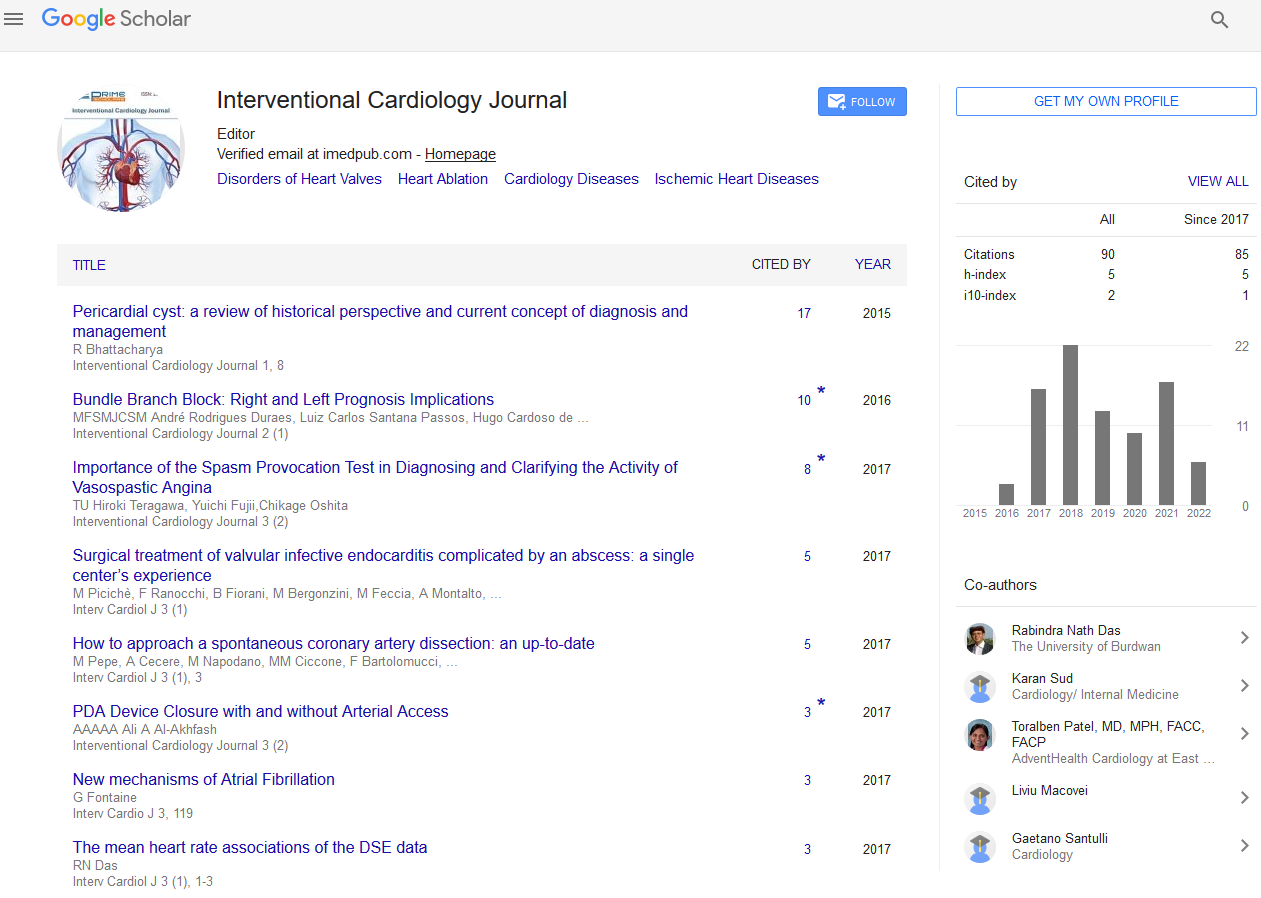Commentary - (2023) Volume 9, Issue 4
Shielding Hearts: Comprehensive Approaches to Preventing Ischemic Heart Disease
Sansa Joseph*
Department of Clinical Medicine, Bispebjerg University, Denmark
*Correspondence:
Sansa Joseph,
Department of Clinical Medicine, Bispebjerg University,
Denmark,
Email:
Received: 29-Mar-2023, Manuscript No. IPIC-23-17369;
Editor assigned: 31-Mar-2023, Pre QC No. IPIC-23-17369 (PQ);
Reviewed: 14-Apr-2023, QC No. IPIC-23-17369;
Revised: 19-Apr-2023, Manuscript No. IPIC-23-17369 (R);
Published:
26-Apr-2023, DOI: 10.21767/2471-8157.9.4.37
Description
Ischemic Heart Disease (IHD), often referred to as Coronary
Artery Disease (CAD), continues to be a major global health
concern, responsible for a significant burden of cardiovascular-
related morbidity and mortality. However, IHD is not an inevitable
fate; it is a condition largely influenced by modifiable
risk factors and preventive measures. This article explores the
multifaceted strategies for preventing ischemic heart disease,
focusing on lifestyle modifications, medical interventions, and
community-wide initiatives that collectively serve as a shield
against this pervasive cardiovascular threat. Preventing ischemic
heart disease involves a combination of strategies that
target both individual behaviors and broader societal factors.
By addressing risk factors and promoting heart-healthy lifestyles,
the burden of IHD can be significantly reduced, leading
to improved cardiovascular health, enhanced quality of life, and
decreased healthcare costs. Embrace a diet rich in fruits, vegetables,
whole grains, lean proteins, and healthy fats. The Mediterranean
diet has been associated with a reduced risk of heart
disease. The Dietary Approaches to Stop Hypertension (DASH)
diet emphasizes reducing sodium intake and consuming foods
high in potassium, calcium, magnesium, and fiber. Reduce intake
of saturated and trans fats found in fried foods, processed
snacks, and baked goods. Engage in moderate-intensity aerobic
exercises, such as brisk walking, jogging, cycling, and swimming,
for at least 150 minutes per week. Incorporate resistance exercises
to build muscle mass and enhance metabolism. Quitting
smoking is one of the most impactful steps toward preventing
ischemic heart disease within weeks of quitting, lung function
improves, blood pressure decreases, and circulation enhances.
Seek professional assistance, such as counseling, medications,
and support groups, to increase the likelihood of success. Engaging
in mindfulness practices, meditation, and deep breathing
exercises reduces stress and promotes relaxation. Regular
exercise helps reduce stress hormones and improves mood.
Combine a nutritious diet with portion control to manage calorie
intake. Regular exercise helps burn calories and maintain
a healthy weight. Educational campaigns increase public understanding
of ischemic heart disease risk factors, preventive
measures, and the importance of early intervention. Providing
affordable and accessible healthcare ensures that individuals
have access to regular health check-ups, screenings, and timely
medical interventions. Adopt a diet rich in fiber, healthy fats,
and low in saturated and trans fats. If lifestyle changes are insufficient,
medications may be prescribed to control cholesterol
levels. Monitor blood sugar levels and adhere to medical
recommendations for management. Adopt a balanced diet,
engage in regular exercise, and follow medical guidance for diabetes
management. Employers can promote employee health
by offering wellness programs that encourage physical activity,
healthy eating, and stress management. Preventing ischemic
heart disease requires a concerted effort on multiple fronts,
from individual lifestyle changes to community-wide initiatives
and medical interventions. By adopting heart-healthy habits,
managing risk factors, and participating in comprehensive preventive
strategies, individuals can significantly reduce their risk
of developing IHD. Furthermore, collaborative efforts involving
healthcare providers, policymakers, employers, educators, and
the public are essential in creating environments that support
heart health. Ultimately, a combined approach empowers individuals
and societies to shield themselves against the devastating
impact of ischemic heart disease and cultivate a future
marked by better cardiovascular health and enhanced well-being.
Acknowledgement
None.
Conflict Of Interest
The author’s declared that they have no conflict of interest.
Citation: Joseph S (2023) Shielding Hearts: Comprehensive Approaches to Preventing Ischemic Heart Disease. Interv Cardiol J. 9:37.
Copyright: © 2023 Joseph S. This is an open-access article distributed under the terms of the Creative Commons Attribution License, which permits unrestricted use, distribution, and reproduction in any medium, provided the original author and source are credited.

